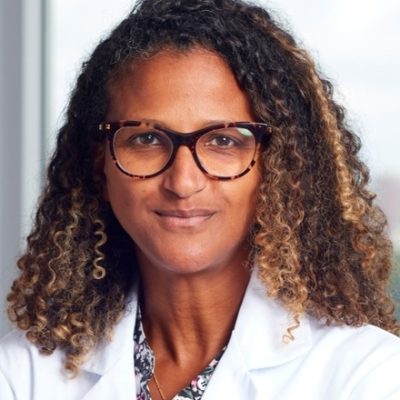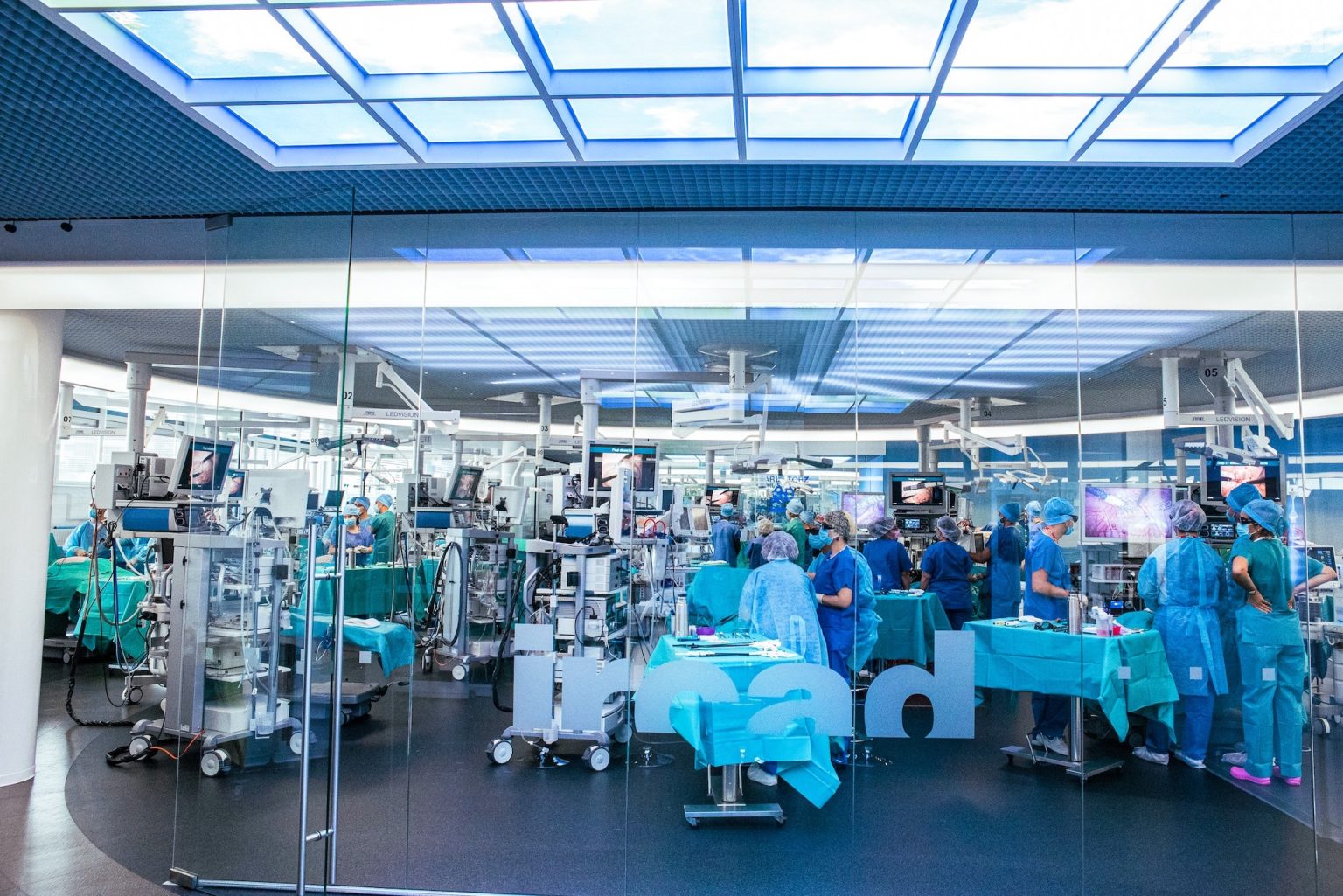
Last month, IRCAD was in Maastricht, Netherlands, for the European Association for Endoscopic Surgery (EAES) congress.
Endoscopic surgery involves performing procedures via natural routes using a flexible endoscope. Initially practiced in gynecology, it later expanded into gastroenterology, attracting significant interest. From the 2000s onward, research around the concept of NOTES (Natural Orifice Transluminal Endoscopic Surgery) surged. In 2004, a team successfully performed an examination of the abdominal cavity on a porcine model by introducing a small camera through the stomach (transgastric peritoneoscopy), without any external scarring. Enthusiastic about this concept, IRCAD launched the NOTES program, which culminated in “Operation Anubis,” the first scarless cholecystectomy (gallbladder removal) performed vaginally. Beyond this milestone, IRCAD’s research has contributed to minimally invasive approaches for treating upper gastrointestinal tract conditions like achalasia of the esophagus and lower gastrointestinal tract conditions like colorectal cancer. As practice advanced, manufacturers developed instruments adapted to this approach, fostering further advancements in this type of surgery.
Past-President of SAGES (Society of American Gastrointestinal and Endoscopic Surgeons), Professor Patricia Sylla has played an active role in this research at IRCAD. Today, she is one of the world’s leading specialists in endoscopic colorectal surgery; her expertise is recognized worldwide, and she regularly participates as an expert in the training courses we organize at the various IRCADs. She explains the benefits of endoscopic surgery for patients.
Professor Jacques Marescaux
President and Founder of IRCAD

Professor Jacques Marescaux
President and Founder of IRCAD
Advances in colorectal surgery in France and around the world.

Prof. Patricia Sylla
Colorectal Surgeon and Chief of Colon and Rectal Surgery, Mount Sinai Health System, New York City
Past-President of the American Society of Gastrointestinal and Endoscopic Surgeons (SAGES), Professor of Surgery, Patricia Sylla heads the Colon and Rectal Surgery Division of the Mount Sinai Health System Hospitals in the United States. A specialist in minimally invasive surgery, particularly colorectal and bariatric surgery, she is internationally renowned for her expertise in the transanal endoscopic treatment of rectal cancer.
Professor Patricia Sylla: At the end of my residency, I received a prize from SAGES, which enabled me to take a course at IRCAD. At the time, I was conducting experimental work on transanal access in rectal surgery and was very interested in the NOTES program developed by IRCAD, which had resulted in the first scarless cholecystectomy in 2007. Professor Jacques Marescaux’s team was a leader in the field, with a real vision of the place and benefits of this type of surgery. Joel Leroy and Silvana Perretta, who worked extensively on the transvaginal and transgastric routes, were very interested in my profile and my knowledge of the transanal route.
I learned a great deal from my experience at IRCAD, and fruitful exchanges with the institute have never ceased. After returning to the United States, I maintained contact with Professor Marescaux’s teams, organizing research in Strasbourg and New York, including numerous experimental cases on cadavers to advance the technique. With Silvana Perretta, more specialized in the gastric route, we compared our practices and considered how we could combine the transgastric and transanal routes. Our work on this new type of surgery led us to engage with manufacturers to improve the available equipment. Collaboration with IRCAD has been extremely fruitful throughout the NOTES program.
Transrectal treatment of rectal cancer involves passing through the natural opening in the anus to resect (remove) the cancer. The extent of resection depends on the size and nature of the cancer. The rectum’s mucosa comprises several layers: mucosa, submucosa, and muscle. If the cancer is in the superficial layer, it can be easily removed without incising the rectal wall. If it has invaded other layers, the tumor must be removed beyond the superficial layer, often requiring lymph node removal, necessitating a more complex dissection. The transrectal route allows direct, minimally invasive access to the tumor.
The most significant advantage of this technique is its facilitation of rectal tumor resection, particularly for cancers located very low. The lower the cancer, the more challenging the surgery, as advancing towards the tumor without seeing it is difficult, especially in men with narrow pelvises and obese individuals. Laparoscopic or robotic surgery in these patients is often converted to open surgery for safety.
Additionally, when the cancer is a few centimeters from the anus, laparoscopic or robotic approaches do not always allow for anus preservation, resulting in a permanent colostomy. The transanal approach avoids these pitfalls by reversing the order of surgical progression: starting from the anus and working up to the tumor, visible immediately on 4K HD monitoring screens, enabling precise resection with fewer conversions to open surgery (less than 5% compared to 10-20% for laparoscopic surgery) and avoiding anal sphincter removal. This approach allows patients to maintain bowel transit, with necessary lifestyle adaptations. Most patients, particularly younger ones (35-55), prefer to avoid mutilating surgery. However, we are seeing more young patients.
Although the anal sphincter is preserved, it is weakened by the surgical procedure. Pre-surgery, patients must be prepared psychologically, understanding the changes in their daily life. Post-operation, various measures enable a normal life without leakage risk:
The technique’s development was subject to regulatory constraints. Techniques are developed not for their own sake but to overcome the limitations of other approaches, proving their non-inferiority or benefits through clinical studies and refining indications for the greatest benefits. In colorectal cancer surgery, this assessment is challenging and time-consuming due to long-term result evaluations. Today, the benefits are established. However, this complex surgery requires extensive training, inaccessible to all surgeons. Training is crucial, and IRCAD has played a decisive role. Currently, too few teams worldwide are trained in this technique, highlighting the need for advanced training for patient benefit.
About IRCAD
Founded in 1994 by Professor Jacques Marescaux, IRCAD is dedicated to training and research in minimally invasive surgery. The Strasbourg-based institute is internationally renowned for its excellent training courses, both face-to-face (nearly 8,800 surgeons trained annually in Strasbourg) and virtual, through the Websurg online university, which has over 470,000 members worldwide.
For more information, please visit https://www.ircad.com
We hope you enjoy this 13th issue of the IRCAD newsletter. For further information, to subscribe or unsubscribe, contact:
FINN Partners – sante@finnpartners.com
Don’t miss the latest news from IRCAD.
Sign up here for our newsletters and communication mailings
to stay informed about us and our courses

Please note that the IRCAD administrative board and staff are closely monitoring the evolving COVID-19 situation, in full compliance with all applicable laws and regulations in France. The health, safety, and well-being of our participants, experts and staff are our top priority!
Despite the current context, the IRCAD stands firmly by your side to help you acquire knowledge and skills. Come and join us !
We would like to draw your attention that the « Vaccine Pass » is now mandatory in France since end of January 2022 and replaces the former « Health Pass » to access places that are open to the public, such as cinemas, museums, cafés and restaurants, hotels as well as the IRCAD Institute which welcomes participants in the framework of its courses and seminars. Thus, a PCR test without vaccination is no longer sufficient to take part in our courses.
The vaccine pass includes a proof of the following (one of the 3 items is sufficient):
Further information about the new vaccine pass can be found at :
We very much hope to be able to count on your kind understanding of those rules which have been set by the French Government and which our Institute is required to apply